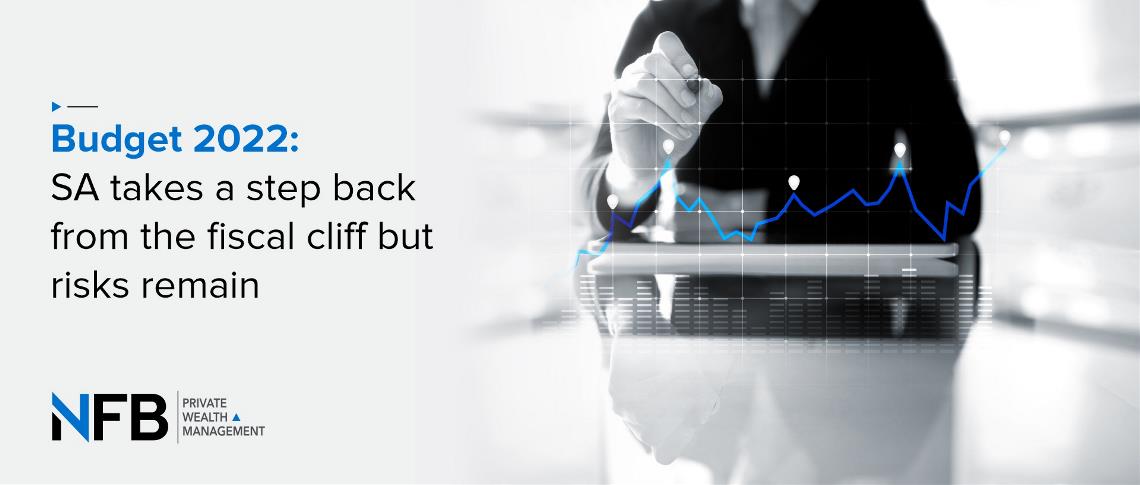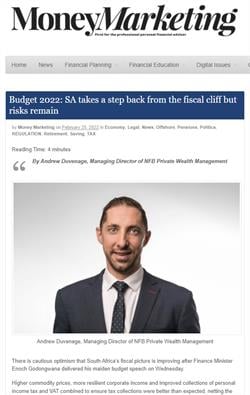Budget 2022: SA takes a step back from the fiscal cliff but risks remain
There is cautious optimism that South Africa’s fiscal picture is improving after Finance Minister Enoch Godongwana delivered his maiden budget speech on Wednesday.


There is cautious optimism that South Africa’s fiscal picture is improving after Finance Minister Enoch Godongwana delivered his maiden budget speech on Wednesday.
Higher commodity prices, more resilient corporate income and improved collections of personal income tax and VAT combined to ensure tax collections were better than expected, netting the fiscus a R181 billion tax windfall taking revenue to a record R1.5 trillion. The budget deficit has reduced to 5.7% of GDP rather than the 6.6% anticipated in November 2021’s Medium Term Budget Policy Statement. National Treasury says it remains committed to reducing the fiscal deficit and stabilising debt.
South Africa’s debt servicing costs remain a challenge and are the fastest growing expenditure item on the budget. In the next financial year, South Africa will spend R301.8 billion of its total R2.16 trillion budget on servicing debt of R5.43 trillion. The prospect of a rising global interest rate environment remains a risk.
Higher tax collections are primarily the result of a boom in the price of commodities. Godongwana is well aware that permanent expenditure cannot be planned on the basis of what is likely to be a temporary increase in commodity prices. While acknowledgement of this fact is positive, it remains to be seen if expenditure creep can be held at bay over time.
There was good news – and some relief – for taxpayers given that there will be no increase in personal tax or the VAT rate. The latter would certainly have been a hugely unpopular hike. An expected hike in fuel levies did not materialise. In this respect, it is pleasing to see that the Minister has agreed with former Finance Minister Mboweni’s position that South Africa is past the point of diminishing returns when it comes to the tax yield generated from increasing tax further.
Personal income tax brackets were adjusted upwards by 4.5%, following last year’s above inflation upward adjustment of 5%, proving taxpayers with ongoing inflation protection.
For the past two years National Treasury has been focused on broadening the tax base rather than hiking taxes. Godongwana revealed that tax hikes in recent years have failed to generate the expected revenue. Interestingly, the increase of the top marginal rate to 45% for high income earners generated far less than the expected R4.4 billion a year.
The offshore limit for local pension and savings funds to invest offshore has been adjusted to 45%, including the 10% allowance for investments into other countries. This limit was previously 30%. The amendment announced in the budget means that funds can now invest up to a maximum of 35% outside Africa.
The finance minister also confirmed that the corporate tax rate would be reduced by 1% to 27% for companies with tax years ending either on or after 31 March 2023. While this reduction is a welcome move, South Africa’s corporate tax rate remains higher than the 23% average corporate tax rate of the Organisation for Economic Co-operation and Development member countries.
Despite the tax windfall, Godongwana is aware that the economy continues to face enormous risks. He stressed that without structural reforms to enable economic growth, encourage investment and create jobs, it will be hard to turn the tide.
State owned enterprises (SOEs) continue to pose a risk to the economy and a drain on the fiscus. While Godongwana promised ‘tough love’ to SOEs, more than R308 billion has been allocated to bailing them out. He revealed that the Presidential State-Owned Enterprises Council would be considering which SOEs to retain and which should be disposed of or consolidated based on the value they create and their potential sustainability.
The public sector wage bill poses another major risk to the economy. Public sector employees will continue to receive the monthly non-pensionable cash payment of between R1 200 and R1 700 until negotiations have concluded, said the minister. In a recently published report, the IMF said it did not believe the state would be able to honour its commitment to rein in the public sector wage bill.
South Africa’s unemployment statistics are a significant cause for concern. Godongwana revealed that social grants are paid to nearly half of the country’s population. National Treasury expects real GDP growth of 2.1% in 2022 and for it to average 1.8% over the next three years to 2025, which is slightly higher than what it projected in the Medium-Term Budget in November last year. However, at this rate South Africa will battle to meaningfully broaden its tax base, and herein lies the risk. When the tax windfalls subside, and economic growth slows, will South Africa be back in a position where fiscal deficits are unavoidable and an unsustainable debt picture reasserts itself? The reality is that if South Africa reverts to low growth rates, it will have serious issues down the road.
While Godongwana’s maiden budget delivered few surprises and was appropriately measured and considered, it will now be up to the various arms of government to rein in unnecessary expenditure and create a business-friendly environment to encourage investment and restore business confidence. None of these concepts, risks or proposed “solutions” are new. They have been referenced ad nauseum in the past. The proof will be in the execution. . Will Treasury hold the line on expenditure – irrespective of political pressure – and can government start executing on the reforms that it has spoken about for many years?
 |
This article was published by Money Marketing, South Africa Today, Supermarket and Personal Finance (Bellan Media). |













